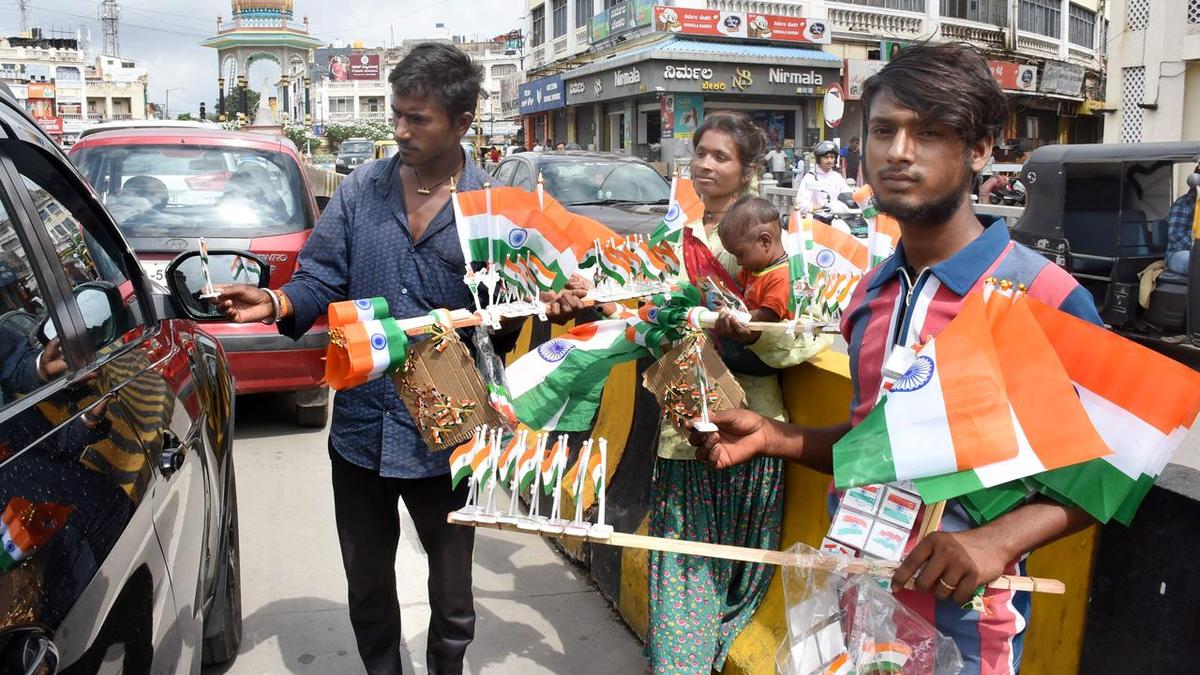Amid criticism by the opposition BJP and JD(S) that guarantee schemes had rendered Karnataka ‘bankrupt’, Chief Minister Siddaramaiah sought to argue in his Independence Day address that the State’s economy was robust, bolstered by its welfare schemes. This, he underlined, was despite ‘facing discrimination in distribution of resources from the Centre’.
Delivering the Independence Day address at the Field Marshal Sam Manekshaw Parade Ground in Bengaluru on August 15, the Chief Minister said the State ranks first in the country in per capita income. Over the past decade, the State had achieved a growth of 101% in this indicator, from ₹1,01,858 at constant prices in 2013–14 to ₹2,04,605 in 2024–25.
Countering the argument that capital expenditure had taken a back seat owing to guarantees, he said, “This year, we have allocated ₹83,200 crore for capital expenditure. Karnataka is among the leading States, with 20.1% of its budget dedicated to infrastructure development.”
Impact of good rains
The Chief Minister sought to argue that Karnataka focused on both agriculture and industry. He said that bountiful rains this year had particularly helped in augmenting agricultural and horticultural production. “Compared to previous years, in 2024–25, we have broken all previous records in agricultural and horticultural output,” he said.
Pointing out that the previous government sought to privatise APMCs, handing over farmers’ livelihoods to corporate capitalists, Mr. Siddaramaiah said, “In contrast, our government strengthened APMCs, resulting in record arrivals of 164 lakh metric tonnes of agricultural products in 2024–25, a remarkable increase of 447%. This is the highest in the history of Karnataka’s APMC.”
The government has allocated ₹51,339 crore for the agriculture sector in the 2025–26 budget, an increase of 52.34% compared to 2022–23.
Listing out measures for the industrial and tourism sectors, the Chief Minister said 18 industrial areas covering 44,166 acres have been declared Special Investment Regions. “Investors have expressed interest in bringing in over ₹10 lakh crore in investments. Out of this, 48% has already been processed under Single Window IT Platform. Karnataka remains among the nation’s leading industrial States, with the manufacturing sector contributing 23.6% to the State’s GSDP, and our State ranks second nationally in foreign direct investment,” Mr. Siddaramaiah said.
On the other hand, Chief Minister Siddaramaiah said that his government’s guarantee schemes are ‘transforming the trajectory of Karnataka’s development’.
For better distribution
“Surveys by leading national institutions reveal a stark truth: the wealthiest 10% of our population hold 80% of the nation’s wealth, yet they contribute only about 3% of the GST collected. The remaining 90% ordinary people, who work daily for food and clothing, shoulder nearly 97% of GST payments. How can any economy sustain itself under such circumstances? It is with the intention of finding answers to these very questions that we launched the guarantee schemes and other welfare programmes. Our government is spending more than ₹1.12 lakh crore on welfare measures, including guarantee schemes, subsidies, incentives, scholarships, social security pensions, and other social programmes,” he said.
“The ideology of Manuvad asserts that only the powerful should thrive while the rest remain as labourers and subordinates, an idea similar to Social Darwinism. In contrast, our Constitution stands firmly for Samvidhanvad, the principle that the weakest and most vulnerable must receive priority,” Mr. Siddaramaiah said.
‘Committed to caste census, internal quota’
Chief Minister Siddaramaiah said the decision to conduct a social and educational survey of the backward classes (popularly called caste census) through the Karnataka Backward Classes Commission was taken to understand people’s living conditions.
“Only accurate data can shape policies that transform lives and future schemes, which can provide special representation and targeted justice. To ignore this would be to betray both our Constitution and our freedom struggle. Hence, our government is serious about internal reservation within the Scheduled Castes and conducting a socio-educational survey of the backward classes,” he said.



.png)
.png)
.png)
















 1 hour ago
3
1 hour ago
3









 English (US) ·
English (US) ·